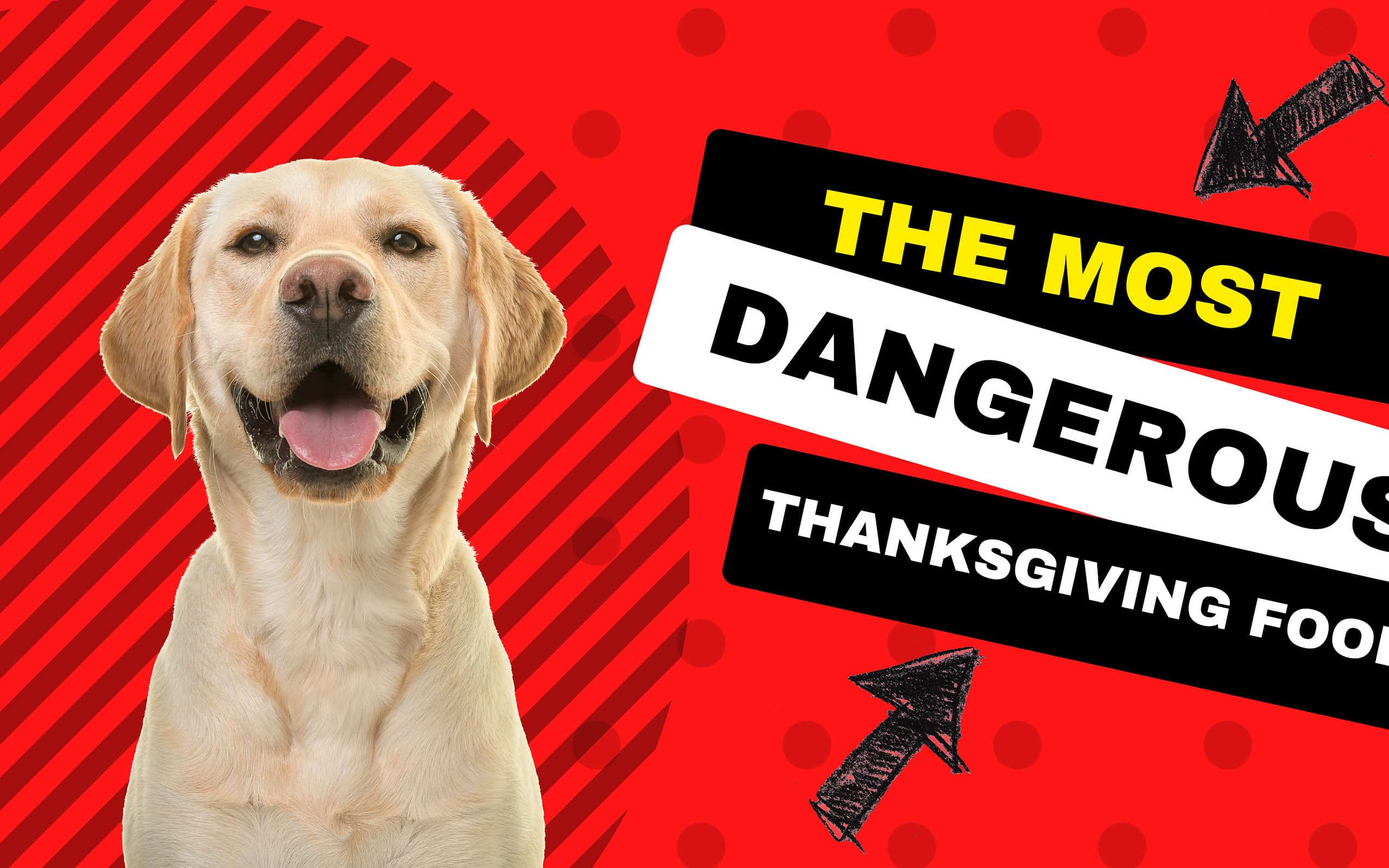Thanksgiving is a wonderful time when family and friends can join together and share what each person is thankful for from the past year. It is a time to share accomplishments, pause for those who are no longer around, and share in cultural foods cooked together with loved ones.
However, Thanksgiving can be dangerous for pet owners. Every year, dozens of dogs are rushed into emergency centers, turning a pleasant evening into a stressful nightmare. These visits are usually an accident of a few stray crumbs falling to the floor or someone unknowingly sharing food that is toxic to pets.
Families should contact the American Society for the Prevention of Cruelty to Animals (ASPCA) poison control helpline at (888) 426-4435 in case of emergencies.
To ensure everyone has a happy and safe holiday season, memorize these toxic Thanksgiving foods for pets.
Turkey Skin
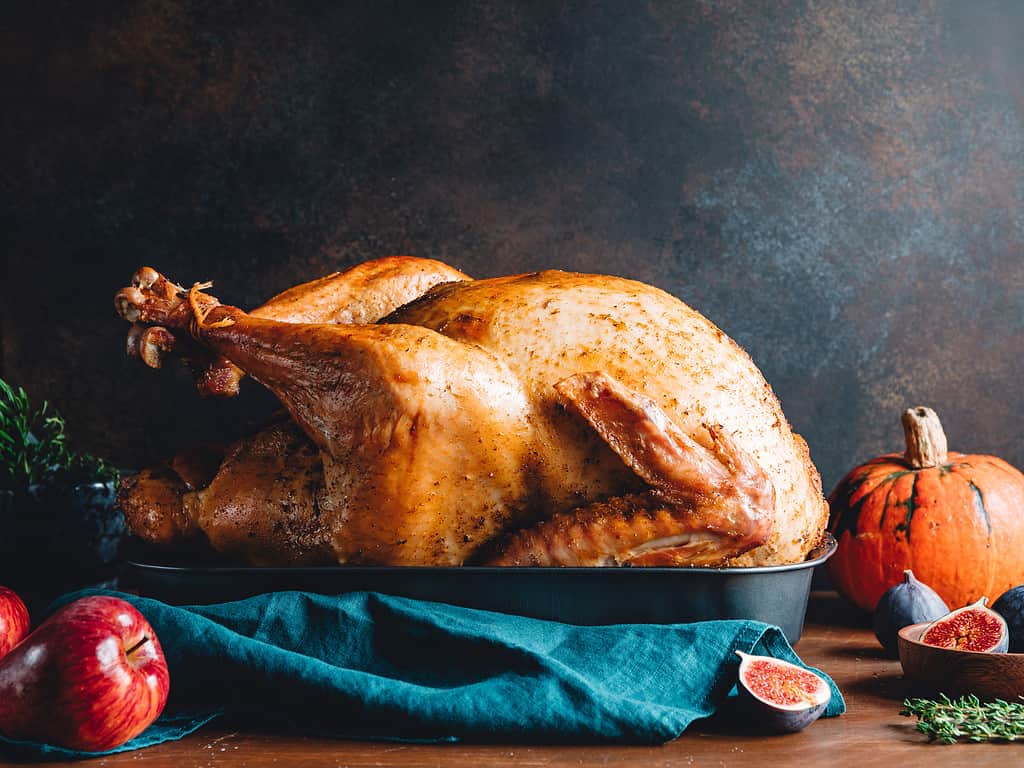
Pork, chicken, and turkey skin are all high in fat and should not be fed to pets.
©Edalin/iStock via Getty Images
Turkey is the centerpiece and iconic dish for many Thanksgiving tables. The meat is tender, delicious, and full of tryptophan to put everyone to sleep after a hearty meal.
Normally, turkey meat is safe to feed pets. Several pet foods suggest turkey meat as a substitute protein for pets allergic to chicken. Families must be cautious of turkey skin.
Turkey skin is very fatty and should not be given to pets. Ingestion may cause pancreatitis (inflammation of the pancreas), vomiting, diarrhea, weight gain, and liver problems. Pets will suffer from moderate to severe pain, high fevers, and tenderness in the belly.
Chicken skin should also be avoided.
Gravy
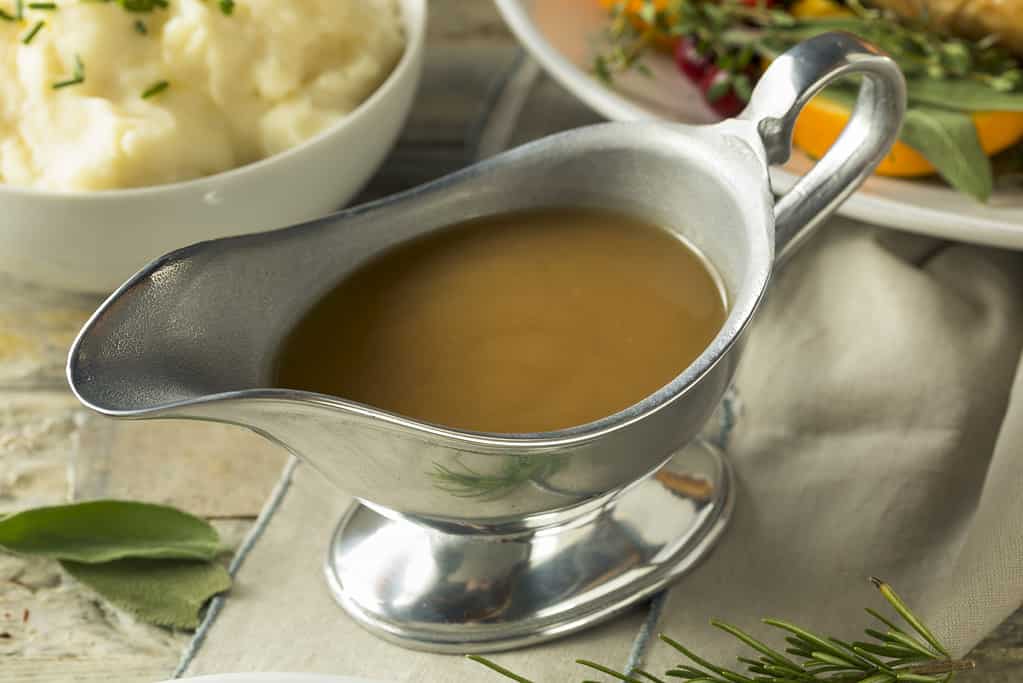
Gravy and other broths have high sodium levels which quickly spike blood levels.
©bhofack2/iStock via Getty Images
Turkey is delicious on its own, but no dish is complete without a creamy and flavorful drizzling of gravy. Gravy keeps the turkey juicy and makes an already scrumptious dish more delectable.
However, gravy contains high levels of sodium and fat. Pets eating gravy may suffer from dehydration, kidney damage, and sodium ion poisoning. Sodium ion poisoning is a sharp increase of sodium levels in the blood, which can cause severe health effects if not treated.
Families that make homemade gravy season it with garlic and onions, two ingredients also extremely toxic to pets.
Ham
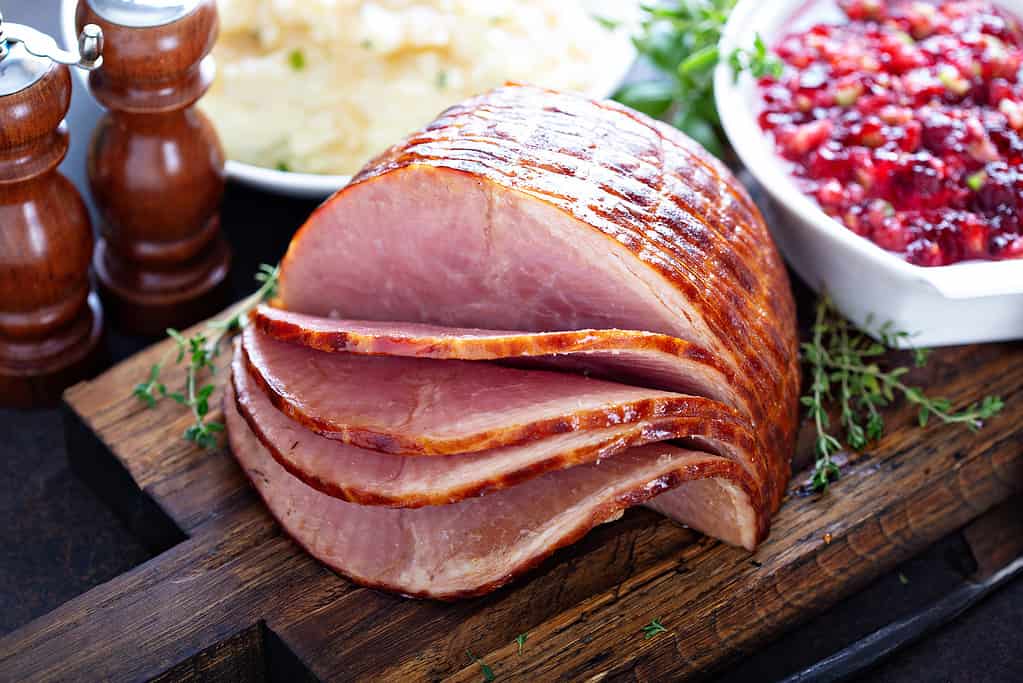
Unprocessed and uncured ham with the fat trimmed off is safer for pet consumption.
©VeselovaElena/iStock via Getty Images
Ham is a common secondary or main dish for Thanksgiving tables, especially with ethnic families that favor ham and pork over poultry. Pig meat is one of the most popular proteins in the world because of how plentiful it is, the different styles of pork meat is cooked, and how good it tastes.
Pork is another substitute protein for pets with chicken allergies but in limited quantities.
Thanksgiving ham, including some breakfast pork meat like bacon, is very fatty and high in sodium. Offering too much ham may cause pancreatitis, weight gain, and liver damage in pets.
Turkey Bones
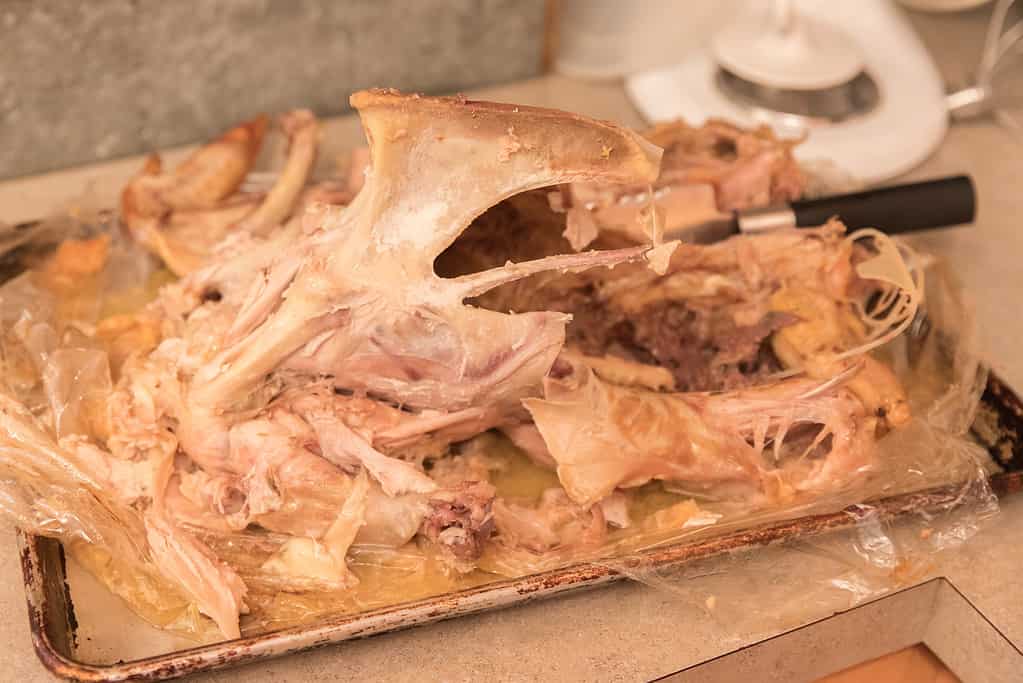
Chicken, turkey, ham bones are soft and break easily, which can cause severe internal damage if swallowed.
©Jennifer McCallum/iStock via Getty Images
Everyone knows that dogs love bones. It is shown in media, children’s books, and pet stores that it is common knowledge to the whole world.
But cooked bones are extremely dangerous for pets. Cooked turkey, chicken, or ham bones are flavorful, but easily broken. Pets can snap the bones while chewing them, swallowing small, sharp shards. These shards can pierce the esophagus, stomach lining, or intestine walls. Severe cases of eating broken bones lead to infections, internal bleeding, vomiting, bowel obstruction, and organ damage.
Always monitor pets when giving them pet-safe bones from stores. Immediately remove any broken pieces or shards to prevent pets from ingesting them.
Dairy
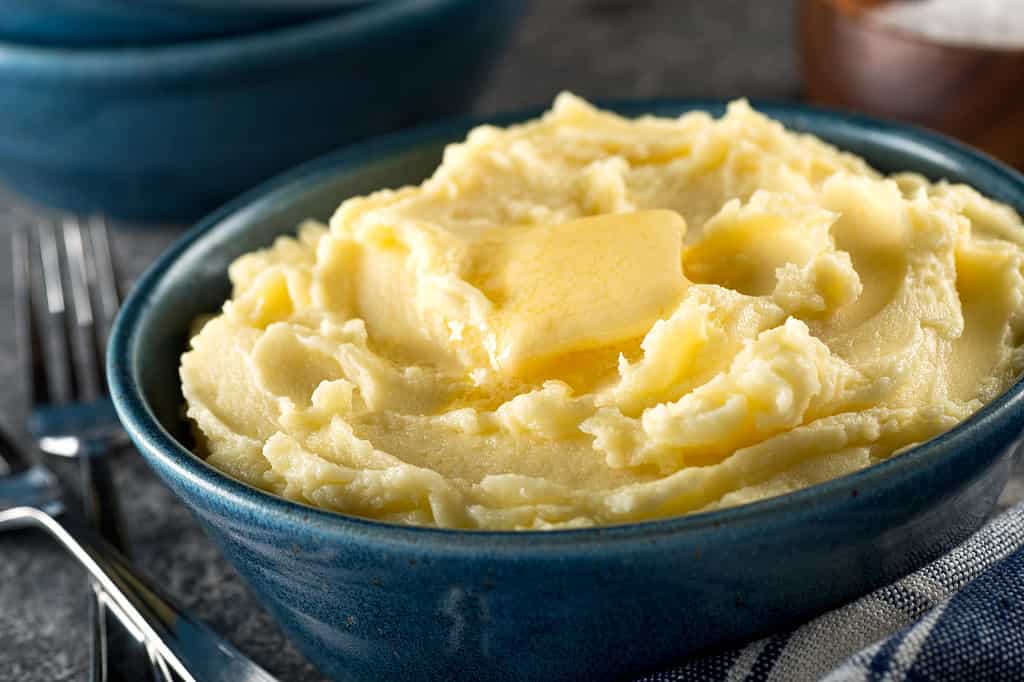
Plain mashed potatoes without butter or seasonings are safe for pets.
©Fudio/iStock via Getty Images
The smell of buttery mashed potatoes, smooth cream to sweeten coffee and tea, melted and gooey cheese on macaroni is enough to send families into a feeding frenzy to get the biggest helping while it’s hot.
Dogs and cats feed on milk while they are young but become lactose intolerant as they age. Their bodies cannot handle dairy products anymore. Many dairy products have high sugar levels and fat content, increasing the risk of obesity, heart disease, or diabetes.
Most pets will develop digestive problems like vomiting and diarrhea for several days.
Grapes and Raisins
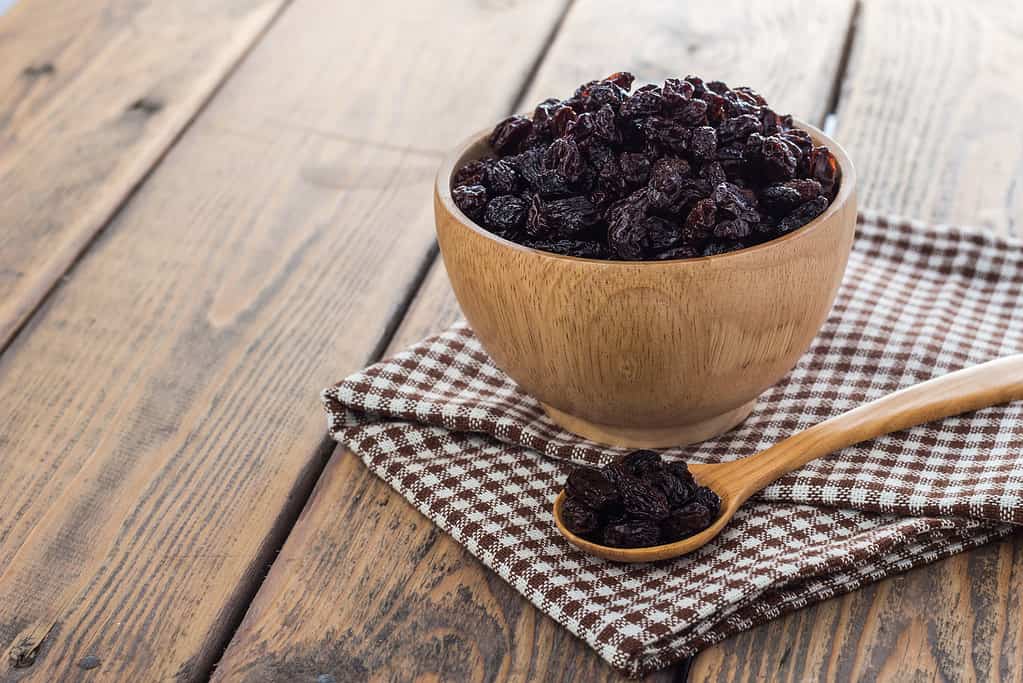
If a grape or raising is swallowed, parents have 30 minutes to induce vomiting in their dog before the grape is digested.
©12521104/iStock via Getty Images
Grapes and raisins are one of the most toxic fruits to feed pets. These fruits are commonly mistaken for blueberries, which are safe for dogs to consume.
Pets cannot process the tartaric acid in grapes and raisins, causing them to go into acute renal failure when eaten. During acute renal failure, the kidneys cannot filter waste products in the blood, causing severe health effects throughout the body. Depending on the size of the animal, swallowing a single grape can be fatal.
Garlic
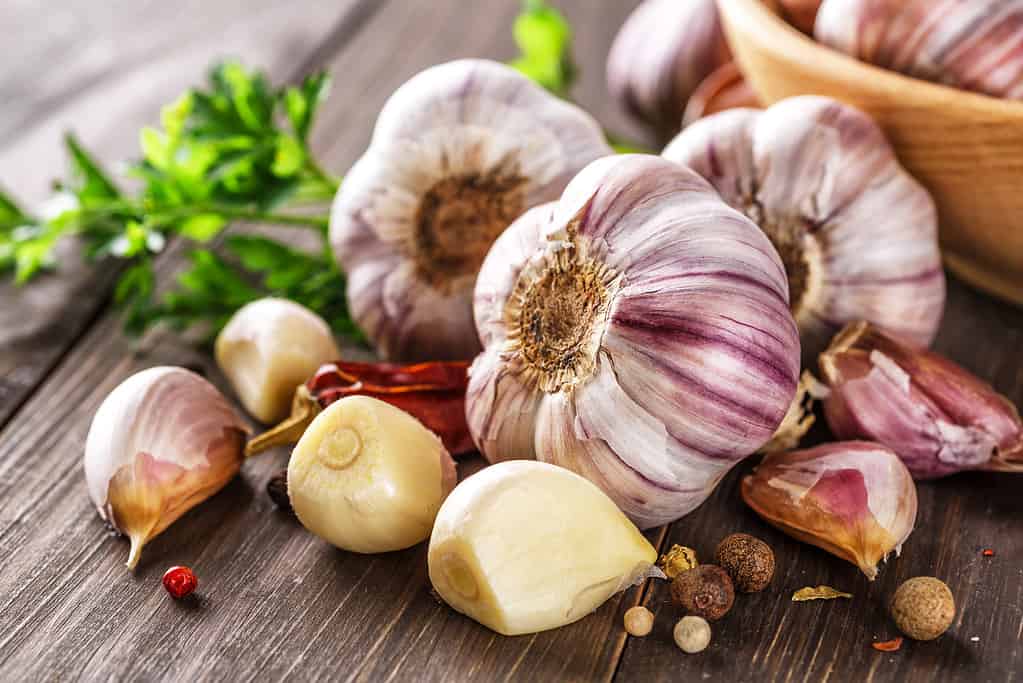
Small amounts of garlic is safe, it becomes dangerous if a pet eats a whole clove or more.
©IURII BUKHTA/iStock via Getty Images
A popular seasoning for every dish, garlic is delicious, nutritious, and supports great immune function. Technically, garlic can be safe for pets in small doses. Tiny amounts of garlic can support their immune health to fight diseases.
However, Thanksgiving offers many foods with large amounts of garlic, over the recommended tolerance of a pet’s body. A pet eating too much garlic will suffer from anemia. Anemia is damage to or an insufficient amount of red blood cells (RBCs), preventing them from carrying oxygen to the body. Garlic contains disulfide, a compound that specifically targets RBCs.
Pets suffering from garlic powder or garlic poisoning will suffer from vomiting, diarrhea, lethargy, weakness, rapid breathing, and pain. Serious cases may cause collapse from lack of oxygen, prompting an emergency visit.
Onions are equally toxic to pets and will cause similar side effects because they contain disulfide.
Stuffing
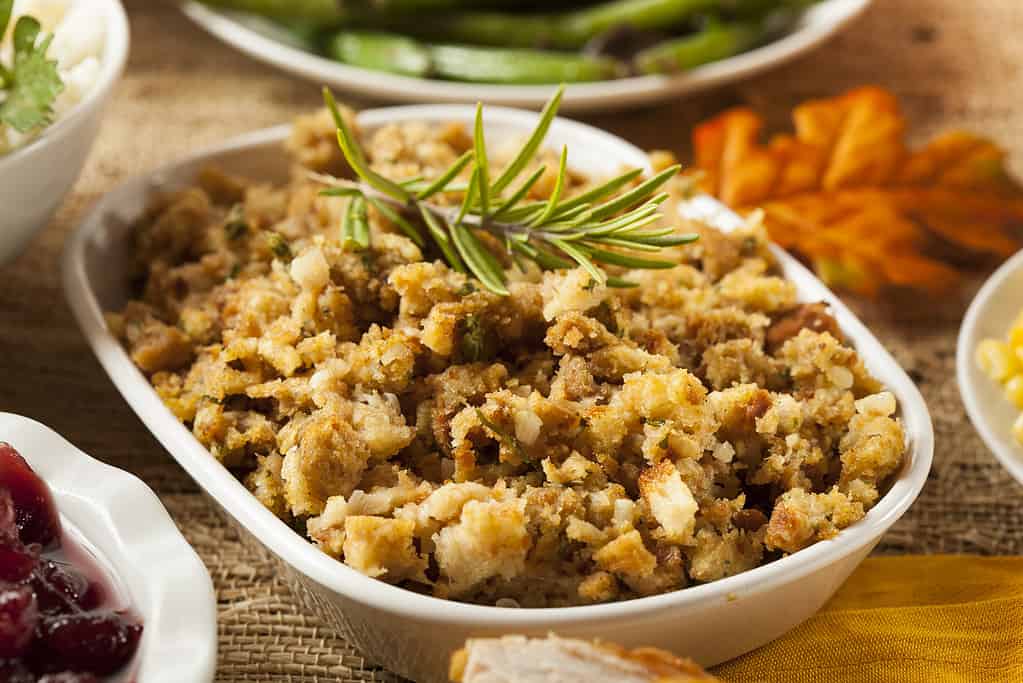
Dogs and cats cannot digest bread well, so it will make them gain unhealthy weight.
©bhofack2/iStock via Getty Images
Dried bread cubes, diced vegetables, protein, and some broth, baked at the perfect temperature create the perfect stuffing side dish for Thanksgiving dinner. Stuffing is a glorious balance for all the meat, mac and cheese, and other dishes to sit next.
Unfortunately, pets cannot partake in stuffing because many recipes contain garlic, shallots, leeks, onions, and chives, all ingredients highly toxic to pets. Like garlic and onions, pets eating stuffing can suffer from anemia and horrible health effects which can lead to an emergency clinic.
Chocolate and Desserts

All baked goods containing xylitol should be avoided with pets.
©Estudio conceito/iStock via Getty Images
What is Thanksgiving dinner with chocolate pie or a dessert with some chocolate on top? Desserts metaphorically and sometimes literally add a cherry on top to the entire evening.
It is common knowledge that chocolate is dangerous for pets. Specifically, the ingredient xylitol is highly dangerous for animals because it decreases blood sugar levels which can lead to seizures. Seizures can last from a few seconds to several minutes and is a terrifying experience for families to watch as their beloved pets uncontrollably convulse.
Pet parents should avoid feeding their pets chocolate, certain peanut and nut butter, mints, and several baked goods like cakes and pies.
Caffeine

Some vets claim a small sip of coffee or tea may not affect large dogs as much, but it should still be avoided.
©Rawpixel/iStock via Getty Images
Today’s common person cannot function without coffee or tea. Both have excellent health benefits and great ways to respectively start and end a night.
Sadly, caffeine can be dangerous to pets depending on their size and health condition. Pet parents should not let their pets drink coffee or tea, especially small breed dogs or animals with heart conditions like Cavalier King Charles Spaniels.
Pets drinking caffeine will increase their chances of heart arrhythmias (irregular heartbeats), vomiting, diarrhea, tremors, or seizures.
Macadamia Nuts
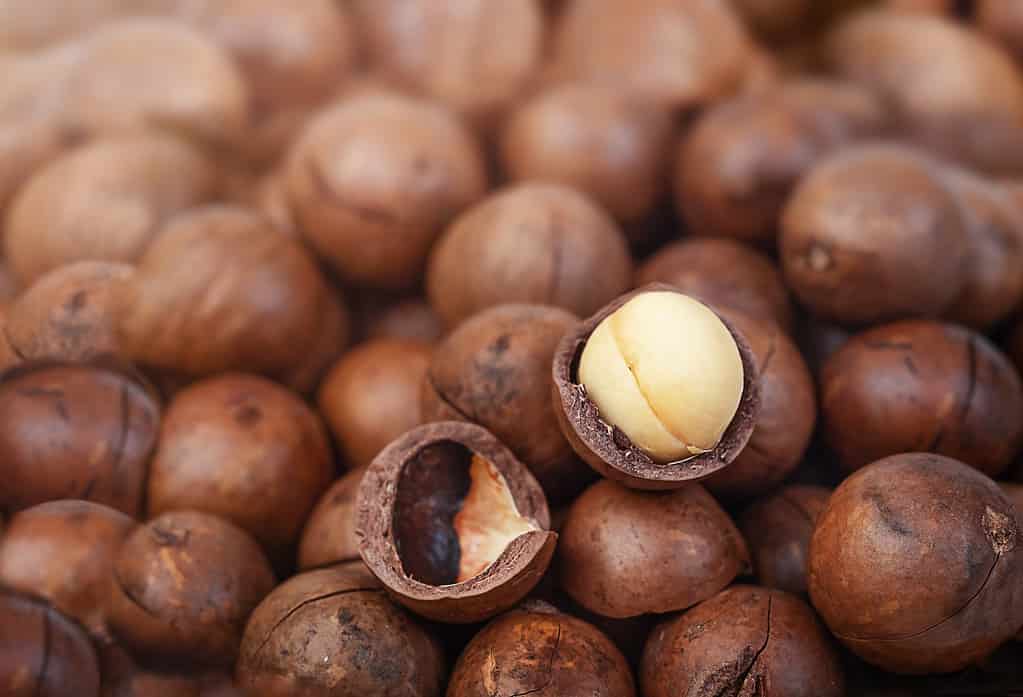
Macadamia and walnuts are very fatty and causes GI issues in pets.
©Valeriia Kuznetsova/iStock via Getty Images
A small snack to have on the side or one of the many desserts to save room for later, macadamia nuts are a nutritious treat that is always welcome on Thanksgiving dinners.
Unfortunately, pets cannot partake in these nutritious nuts because of their high-fat content. Pets will suffer from pancreatitis, vomiting, diarrhea, fevers, or poor coordination ingesting a few.
Pet parents should avoid walnuts as well because of their similar high-fat content.
Nutmeg
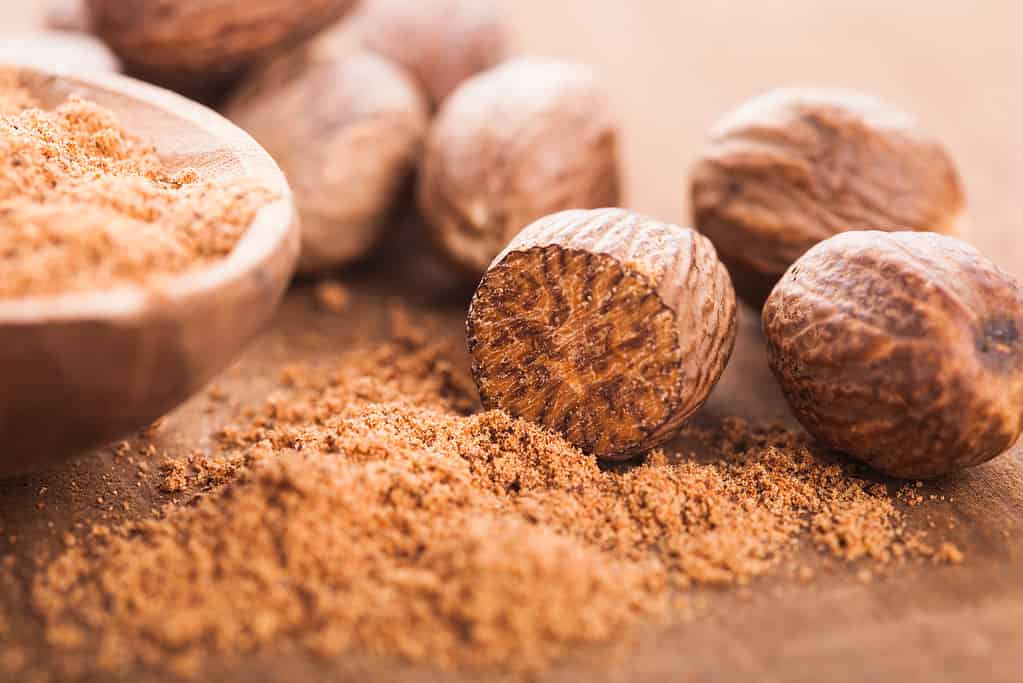
Pets suffering from hallucinations will phantom bite the air or become afraid of invisible objects.
©oksix/iStock via Getty Images
Nutmeg is a common ingredient to flavor pies and desserts. While delicious, small doses are dangerous for pets.
Nutmeg contains myristicin, a compound that causes high blood pressure, hallucinations, abdominal pain, and seizures.
Canned Peas
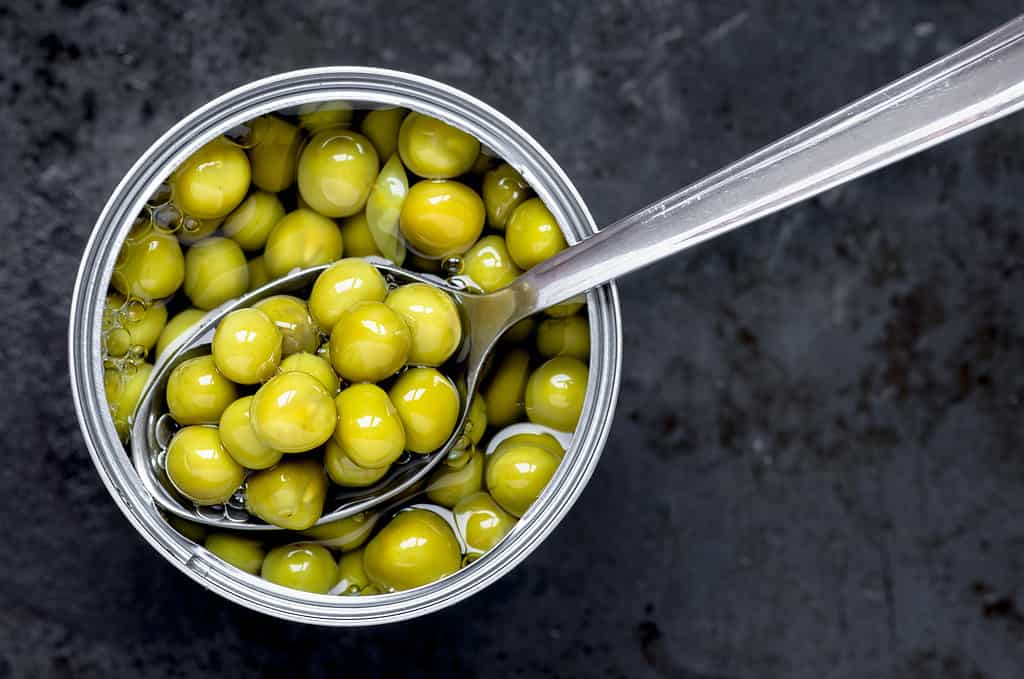
Frozen peas are safe for pets and make an excellent treat for training.
©Photosiber/iStock via Getty Images
Peas are a health source of vitamins C, E, zinc, and antioxidants to support the immune system. They help make Thanksgiving dinner feel healthier while patrons engorge themselves.
Normally, peas are safe for pets to eat because they are unflavored and untampered by companies. Canned peas have a higher sodium count, which can lead to sodium ion poisoning, dehydration, and gastrointestinal issues like vomiting and diarrhea.
Alcohol

Never feed a pet alcohol!
©Nicolas Micolani/iStock via Getty Images
It seems crazy that owners would allow their pets to drink alcohol. Still, sometimes accidents happen where a beer is spilled and a dog licks it up, or someone drinks a little too much and finds it funny to share their drink with the house pet.
Pet parents and guests should never give pets alcohol. The yeast in alcohol may cause bloating (rapid expansion of the stomach) which can be fatal if not immediately taken to an emergency center. Additionally, alcohol causes dehydration, liver and kidney damage, and low blood sugar which leaves them vulnerable to other adverse health effects.
Healthy Thanksgiving Snacks for Pets
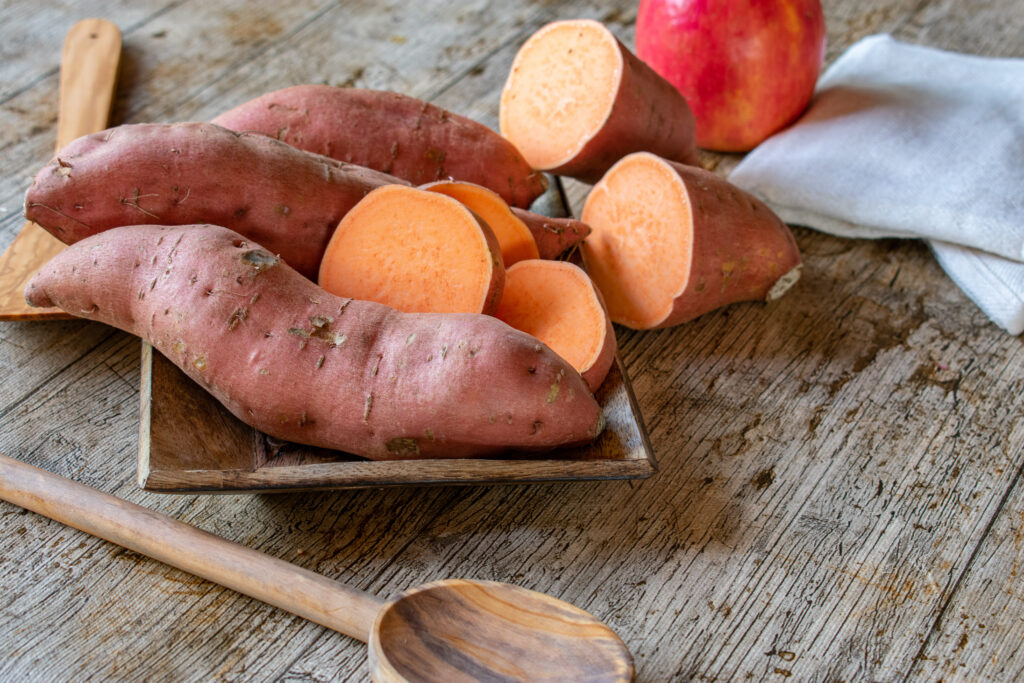
Sweet potatoes are a good and healthy snack for pets with plenty of vitamins and nutrients.
©Angelika Heine/Shutterstock.com
While many foods are toxic to pets, families can offer healthier alternatives to their pets, so they get to celebrate too.
Pet parents can provide their pets with:
- Plain turkey or chicken meat (no seasonings)
- Pumpkin wedges
- Sweet or mashed potatoes (no dairy)
- Corn (plain)
- Green beans
- Pet-safe peanut butter
- Pet-safe yogurt or dessert cups
- Apple wedges (no seeds)
- Blueberries
What To Do If Pet Is Poisoned
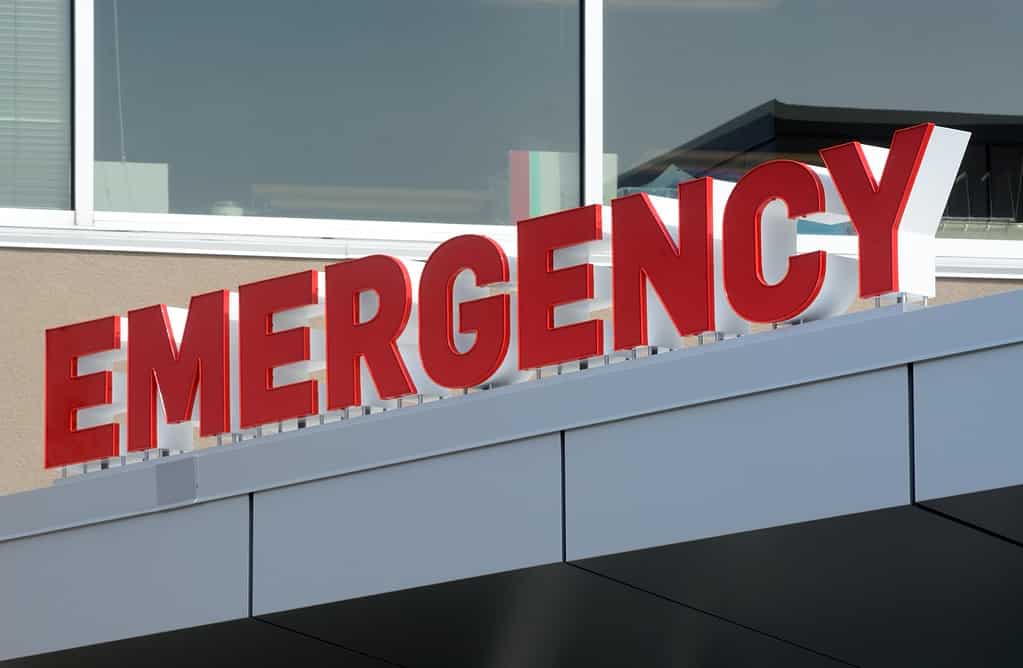
Emergency veterinary clinics are expensive, so pet parents should avoid having their pets ingest toxic foods for their own safety and financial security.
©Merrimon/iStock via Getty Images
In the event a dog or cat eats something toxic, contact the ASPCA 24-hour hotline immediately to determine the severity of the situation.
Some large breed dogs can handle small doses of toxic foods because of their larger size. Small-breed dogs and cats are more susceptible to requiring immediate medical care.
Pet Parents should always have a list of contact information regarding:
- Local animal hospital
- Emergency animal hospital
- ASPCA poison control line
As long as families have all emergency contact information readily available and properly inform their guests not to feed pets any toxic foods, Thanksgiving will be a happy event for all.
Thank you for reading! Have some feedback for us? Contact the AZ Animals editorial team.

